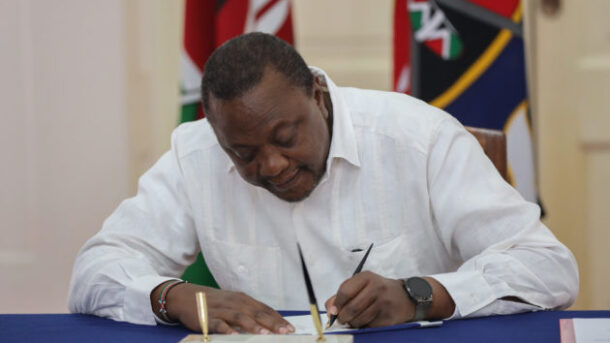Yesterday, the President assented into law the Public Procurement and Asset Disposal (amendment) Bill 2021 bringing forth some changes in the Public Procurement and Asset Disposal Act 2015. Here are the considerable changes that were made:
DEFINITIONS
In the definitions, the following changes and additions were made:
- A procurement professional need not be registered under the Supplies Practitioners Management Act 2007 but only have professional qualifications in procurement or supply chain management from a recognized institution and be a member of the Kenya Institute of Supplies Management or any other procurement or supply chain professional body recognized in Kenya.
- The definition of complex and specialized contracts is included to mean contracts that include procurement where the terms and conditions of an agreement are different from standard commercial terms and conditions, and includes contracts for infrastructure works performed under international agreements containing international terms and conditions.
- The definition of a local contractor is included to mean a person or firm registered in Kenya under the Companies Act, 2015 or any other written law and whose operation is based in Kenya.
FUNCTIONS OF THE PPRA
Under the functions of the Public Procurement Regulatory Authority was added the function developing, promoting and supporting the training and capacity development of persons within the procurement process.
This amendment is crucial in the dissemination of procurement knowledge among stakeholders to develop a more efficient and effective procurement process.
DEBARMENT OF BIDDERS MAKING FRIVOLOUS AND VEXATIOUS REQUEST FOR REVIEWS AT THE REVIEW BOARD
This is a considerable change. Section 41 of the Act is amended to include as a ground for debarment, bidders who file frivolous or vexatious request for reviews meant to solely delay the procurement proceedings or performance of the contract. This is new and ensures that aggrieved bidders do not invoke the jurisdiction of the Review Board under Section 167 to delay the procurement process. It will act as an additional deterrent to the imposition of costs that was being employed before to such applicants at the Review Board.
It is buttressed by the amendment of Section 172 on dismissal of frivolous appeals with costs and forfeiture of deposit to include the IMMEDIATE debarment by the PPRA
INVESTIGATIONS AND INSPECTIONS BY THE PPRA
The PPRA, when conducting investigations, inspections, assessments and reviews relating to procurement and asset disposal may enter the premises of a procuring entity at a reasonable time. If an authorized person from the Authority is refused entry, a magistrate may issue a warrant authorizing such entry using such force as may be necessary upon the application of the Authority.
Section 43 did not previously mandate such entry into premises or recourse to the Authority upon denial of entry but only provided for the inspection, assessment, review or audit.
ACCOUNTING OFFICER’S RESPONSIBILITY TO REPORT TO PPRA WHERE THE PROCURING ENTITY CANNOT COMPLY WITH THE ACT
Section 44 is amended to include the responsibility of accounting officers to seek assistance from the National Treasury where the procuring entity lacks capacity to comply with the provisions of the Act.
This leaves no excuses for procuring entities who may not be able to comply with the Act as they now have a responsibility to consult the National Treasury in such situations and not autonomously make decisions. It makes accounting officers of procuring entities more accountable to the Act for instance with responsibilities such as procurement planning, procuring within an approved budget or even the requirements on budgetary allocations meant for procurements meant for women, youth and persons with disabilities.
COMPOSITION OF THE EVALUATION COMMITTEE
The composition of the evaluation committee has been changed. Instead of the head of procurement function exclusively being the secretary these committees, the burden has been lightened to also include an officer from the procurement function appointed in writing, by the head of procurement function.
This amendment allows for delegation of the duties of the head of procurement function in an evaluation committee but such delegation ought to be in writing. But for this, the delegation is not lawful under the Act which would mean that the evaluation committee is not properly constituted rendering the evaluation moot.
PUBLISHING AND PUBLICIZING OF APPROVED PROCUREMENT PLANS BY ACCOUNTING OFFICERS AND THE NATIONAL TREASURY
Accounting officers are now required to not only prepare and submit the approved procurement plans to the National Treasury as per Section 44 (2) but also to publish and publicize the approved procurement plan as an invitation to treat on its website.
The National Treasury has also been mandated to publish the annual procurement plans of procuring entities as invitations to treat on the state portal, upon their submission by accounting officers.
There was no requirement for publishing the same in the website of the procuring entity or in the state portal. Bidders would then be able to apply to be included in the list of registered suppliers for a procuring entity as per Section 71 upon viewing the approved procurement plan. It additionally helps prospective bidders and contractors to enable themselves be able to prepare for procurement or disposal before the same is advertised or undertaken.
PROCURING AT PREVAILING MARKET PRICES
The requirement under Section 54 (2) that goods works or services with known market prices shall be procured at prevailing market prices has been revamped. Now, the head of procuring entity is required to carry out market surveys which will inform placing of orders or decisions made by a procuring entity.
For infrastructure projects, the head of procurement function is required to lias with the head of the technical function to prepare a market survey at the beginning of every financial year of the costs of goods and services and thereafter prepare a current cost handbook to be revised every six months for use in the decision making.
CORRECTION OF ERRORS
Section 82 abolishing arithmetic errors has been repealed to include exceptions where correction of such arithmetic errors may be allowed. These are in cases where direct procurement, competitive negotiations or framework contracting methods of procurement are used.
The crux of Section 82 being the abolition of correction of arithmetic errors still subsists with the only change being the allowing of said corrections for these three methods of tendering. These exceptions did not exist and the rule on no correction of arithmetic errors applied to all methods of procurement indiscriminately.
FRAMEWORK CONTRACTING
The provisions of Section 86 on what entails a successful tender now do not apply to framework contracting. This amendment revises Regulation 102 (8) of the 2020 Regulations which requires an accounting officer to award a contract under a framework agreement as per Section 86.
Additionally Section 141 on framework contracting has been revamped. The previous provision only allowed application of framework contracting by making multiple awards on indefinite delivery contracts and indefinite quantity contracts
Now a procuring entity may apply framework contracting by making multiple awards of indefinite- delivery and not only indefinite quantity but also definite quantity contracts.
The amendment further defines multiple awards with regards to framework contracting as meaning award of separate (partial) contracts to two or more bidders of the same item.
The notable change is the inclusion of awards on definite quantity procurement contracts to indefinite delivery and indefinite quantity procurements in framework contracting.
COMPETITIVE NEGOTIATIONS
Competitive negotiations as a method of procurement has been recognized. Before, it was just listed as a method of procurement but no provisions existed on when and how it ought to be carried out. The only substantive provisions on competitive negotiation did not provide for it as being a method of procurement but as an incidental process where; there is a tie in the lowest evaluated price by two or more tenderers, there was a tie in the highest combined score points, the lowest evaluated price is in excess of the available budget ( look at Decision Number 119 of 2020 Rhombus Construction Company Limited vs. Kenya Ports Authority where the Board faulted the procuring entity for not applying competitive negotiations where the lowest evaluated price was over the approved budget) and where there is an urgent need that can be met by several known suppliers.
The amendment recognizes competitive negotiations as a standalone procurement process and prescribes that the procedure for the same should be as per Section 132 and award as per Section 133 with necessary modifications.
ADVERTISEMENT OF OPEN TENDERS
Previously, Section 96 only required that invitations to tender be advertised in the dedicated Government tender portals, on its own website or by placement of a notice in at least two daily newspapers of nationwide circulation.
The amendment now includes the option of placement of this notice in at least two free to air television stations and two radio stations of national reach.
This additional option also applies to county specific procurements where procuring entities can now invite expressions of interest in the Government portals, their websites or by placement of the notice in at least two free to air television stations and two radio stations of national reach.
NOTICE INVITING EXPRESSIONS OF INTEREST IN RFP
An accounting officer now is mandated to prepare a notice inviting interested persons to submit expressions of interest. Before the amendment, Section 119 was couched in discretionary terms with the word ‘may’ now replaced by the word ‘shall’ making it mandatory to send this notice prior to the commencement of an RFP for suppliers drawn from the list of registered suppliers.
EVALUATION AND SHORTLISTING OF RFPS
Previously, a minimum of six proposals would be shortlisted for award from the total proposals received and where there was less than six proposals received then a minimum of three proposals would suffice.
Now, where a repeat process fails to yield the requisite members of qualified candidates, a procuring entity shall proceed with the subject procurement and make a report to the PPRA on its inability to conform with this requirement as per the amended Section 44.
SELECTION METHODS FOR RFPs
There is no more a requirement that a procuring entity with the intent to use single source selection method advertise the same and invite anyone who wishes to bid. This amendment makes sense as single source method of selection is used where the goods can only be supplied by one supplier, in response to national disasters or for tasks that represent a continuation of the works being carried out by a firm. It was counterintuitive to advertise and take on new proposals from other suppliers in this method of selection.
Previously under the Act, the use of alternative methods of selection other than the Quality and Cost Based Selection (QCBS) required the submission of a report to the PPRA for approval.
Under the amendment, the report still has to be prepared but now it has to be done within fourteen days of the decision to adopt an alternative selection method.
The PPRA is also required to issue written directions and guidelines governing the reporting requirements for use of alternative selection methods by accounting officers.
AMENDMENTS OR VARIATIONS TO CONTRACTS
Previously, an amendment or variation could only be made after the recommendation of the evaluation committee. Now, the amendment has widened this to allow such amendments to be contemplated and carried out as per the signed contract agreement. This allows more leeway to contractors to initiate variation of contracts.
Additionally, any extension of contract period must now be accompanied by a letter from the tenderer making justification for such extension.
The Act at Section 139 (4) provided for various conditions where a contract may be varied or amended. The amendment has removed the condition that variations can only be considered after twelve months from the date of signing of the procurement contract.
On the condition that the price variation should be based on prevailing consumer price index obtained from the Kenya National Bureau of Statistics or the monthly inflation rate issued by the CBK, the latter condition has been removed.
Condition (b) that quantity variation for goods and services does not exceed 15% of the original contract quantity has been maintained in as much as it does not apply to services but goods only. This makes sense as services are intangible and unquantifiable.
The condition that the quantity variation of works does not exceed 20% of the original contract quantity, the same has been removed
A condition for variation of contract has been added that the price or quantity variation is to be executed within the period of the contract.
On cumulative value of the contract variations not resulting in an increment of more than 25% of the total contract price, the amendment separates this provision into goods and professional service contracts but maintain the threshold percentage at 25% for both.
The method of computing price variation is to be prescribed in the regulations. This is yet to be prescribed.
EXEMPTION FROM PAYMENT OF DEPOSIT AND FILING FEES FOR FILING A REQUEST FOR REVIEW BY WOMEN, YOUTH, PERSONS WITH DISABILITY AND OTHER DISADVANTAGED GROUPS
Section 167 (2) of the Act has been amended to include an exemption for women, youth, persons with disability and other disadvantaged groups from payment of a deposit upon filing a request for review at the Review Board.
Although this amendment is welcome, stakeholders wanted a permanent deletion of Section 167 (2) as the deposit is quite extravagant even for regular bidders bearing in mind this deposit is made in addition to the filing fees as under Section 169. The deposit is to be returned to applicants by the Board upon conclusion of the matter if the Board does not deem the request for review as having been frivolous or vexatious. It is meant to deter frivolous and vexatious request for reviews whose applicants would not receive their deposits back.
Section 169 has also been amended to include waiver of the payment of filing fees by candidates under reserved procurements for women, youth, persons with disability and other disadvantaged groups. Where not waived, the secretary shall prescribe the filing fees payable by such candidates.
PROVISIONS RELATING TO THE CONDUCT OF BUSINESS AFFAIRS OF THE BOARD AND REVIEW BOARD
There is no more a requirement for the Board to provide a fourteen-day notice of a meeting to each member.
This requirement has also been removed for conduct of business affairs at the Review Board.
That’s all folks.
Francis Kabuchu, Public Procurement Law Practitioner and Consultant at Sheria Online



